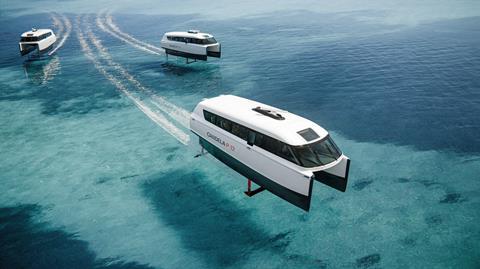In what it describes as a landmark deal, Swedish electric boat producer Candela has announced that its P-12 electric hydrofoil ship is to service the planned network in Neom, Saudi Arabia’s new development taking shape in the Red Sea.
Neom has procured an initial batch of eight of the foiling, electric shuttles, making it the largest announced order in Candela’s history, the company says.

The Candela P-12 was launched last year and is set to debut in Stockholm’s public transport system this autumn. “The P-12 is designed to create zero-emission water transport systems which have significant improvements over traditional water commuting,” says Gustav Hasselskog, Candela CEO and founder.
“Unlike legacy systems with large, slow, and energy-inefficient conventional ferries, the Candela P-12 is a smaller and faster unit, allowing much more frequent departures and quicker journeys for passengers. All daily necessities and services will be just a short boat commute away.”
Flying above the waves on computer-guided hydrofoils, it is said to use 80% less energy than conventional ships, allowing it to combine long range and high speed for the first time in an electric vessel. With a speed of 25kt and more than two hours of endurance, the Candela P-12 claims to be the fastest and longest-range electric passenger ship to date.
Passengers will fly smoothly over the Red Sea, as the P-12’s digital flight control system balances the ship 100 times per second by adjusting the hydrofoils’ angle of attack, keeping it stable even in winds and waves.
As fuel usage rather than the manufacturing phase makes up the bulk of a ship’s environmental impact, energy efficiency is crucial to curb emissions. Since Candela’s foiling vessels use 80% less energy than conventional ships of the same size, a life cycle analysis performed by the KTH Royal Institute of Technology in Stockholm concludes that a P-12 will emit 97.5% less CO2 during its lifetime compared to a conventional diesel vessel of the same size.
The electric Candela C-Pod motors, located in pods underwater, are silent and create minimal disturbance for marine wildlife. When flying, the P-12 creates only a negligible wake, allowing for quicker journeys where conventional ships are speed-restricted due to their massive wakes.
The first batch of eight vessels will be delivered to Saudi Arabia in 2025 and early 2026.
source:ibi


.png)


